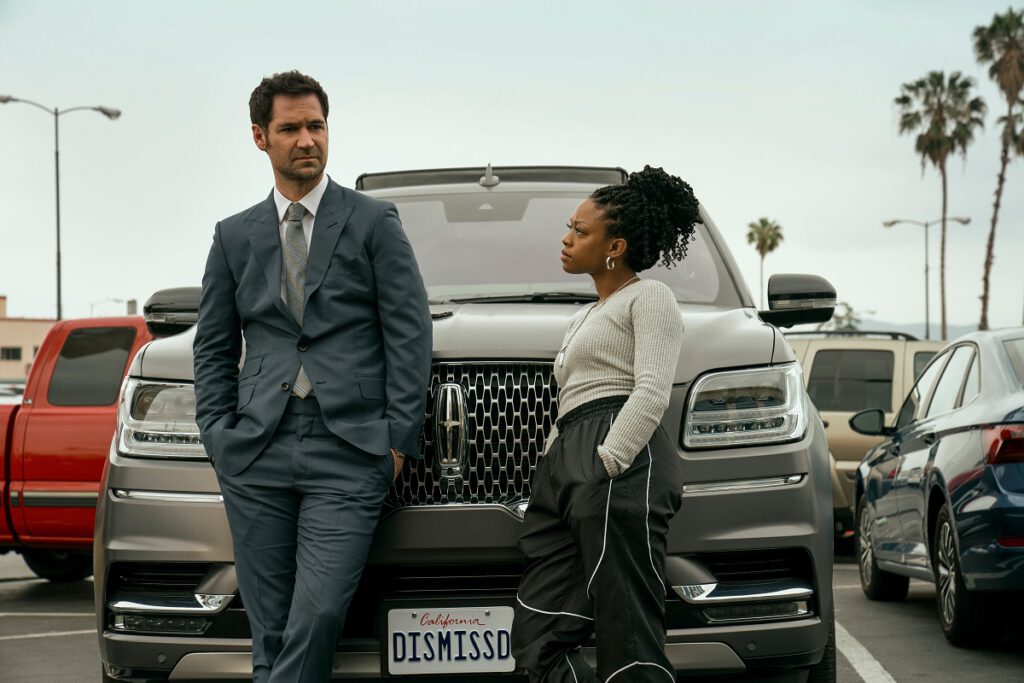You’d think a decade after the release of a semi-successful film would be too late to drop a same-titled TV show. Then again, “The Lincoln Lawyer” served as a thrilling vehicle for Matthew McConaughey, essentially kicking off the McConaissance. And the show, created by David E. Kelley for Netflix, is an adaptation of the second book in the popular Mickey Haller crime series written by Michael Connelly (McConaughey’s was a spin on the first book; this one is on the second, Brass Verdict).
And yet, it’s odd to see the 10-episode “Lincoln Lawyer” on Netflix. Mostly because Kelley’s indelible stamp, a well-worn style of employing multiple storylines springing from unlikely subplots, mixed within a dependable procedural format, makes it seem more at home on network television rather than a streaming giant. Sure, the language gets a tad dirtier and the violence seeps through at times, but the proceedings aren’t any grittier than the noir-inspired McConaughey film nor immediately unplayable on cable. Still—and in spite some of the clumsy political commentary pokes through—those Kelley-ready components make this iteration of “The Lincoln Lawyer” a bingeable, highly enthralling piece of entertainment.
It begins simply: 18 months ago an accident nearly almost killed Haller (Manuel Garcia-Rulfo) and hooked him on painkillers. Now, he’s one year sober. During that time, he stepped away from being the best defense attorney in Los Angeles and separated from his prosecutor wife Maggie McPherson (Neve Campbell). But the murder of his colleague, Jimmy Vincent, by an unknown gunman in a parking garage, lures Haller back into law. Vincent left Haller his practice, populated by a smattering of low-level pro bono cases, petty crimes, and one major media circus: the murder trial of successful game developer Trevor Elliot (Christopher Gorham), who’s accused of killing his wife and her lover.

Before Haller can hit the ground running, there are some caveats: Judge Mary Holder (Lisa Gay Hamilton) orders him to weekly meetings to assure her of his competence. Vincent also left the office in disarray, requiring Haller to hire his second ex-wife, the plucky Lorna (Becki Newton) as his assistant, and her reformed biker gang boyfriend, Angus (Angus Sampson), as his investigator. Meanwhile, a determined, hardened detective, Raymond Griggs (Ntare Guma Mbaho Mwine) is searching for Vincent’s killer, and thinks either Haller or the Elliott trial must be connected to what happened.
After McConaughey, Garcia-Rulfo had big shoes to fill. But the Mexican-born actor, smartly, doesn’t reach for a one-to-one copy of the former’s performance. Instead, he portrays the defense attorney as nervous, less in control of his faculties, but still outwardly cocky and allusive. His turn tracks: With Haller dipping his toe back in the deep end, he wouldn’t be the same man who, in the movie, held a motorcycle gang over a barrel in a shakedown for more money. Here, when that same leather-jacket group comes along, he’s the one taken to the cleaners. This version of the character also arrives with a greater humility. He hires another ex-addict, Izzy (Jazz Raycole), a former client, as his driver for a fleet of Lincoln vehicles with catchy vanity plates (one reads DISMISSD). He loves traversing local LA landmarks like Pink’s Hot Dogs, the Viper Room, and Boardners, and is a doting father to his teenage daughter (Krista Warner). Most of the characters in Haller’s orbit are lovable, but they’re fairly one-note. Much like the locations he visits, they’re deployed more as entertaining scenery than fully fleshed out people.
The courtroom, as it should be, is the draw. Written by Kelley and Ted Humphrey, the early episodes follow a pattern, whereby Haller cleans through smaller, seemingly unwinnable cases involving normal, cash-strapped clients accused of small offenses intertwined with the major throughline, the Elliott trial. The combination serves two purposes: In the minor proceedings we witness Haller’s quick, observational skills and his overwhelming charm (in one instance, he bluffs a flash drive as evidence to clear his client). With Elliott, the bigger headache, Haller’s insecurities rise to the surface, especially as Elliott seems intent on handing his attorney the worst cards possible. The later episodes then meld McPherson’s dogged pursuit of a wealthy human trafficking suspect and Haller’s quest to rebuild his family. Each storyline allows the defense attorney’s smug gruff to fade, while grounded elements spring forward.

Nearly every component of this legal drama—including its lovable characters, fascinating cases, gleeful fourth-wall breaks by Haller explains his strategy, whiz-bang pacing, and bright, clean cinematography—makes for easily digestible episodes, especially as Gorham and Campbell play larger roles. The two add dependable, workmanlike melodramatic beats to otherwise subdued characters, while the series cleverly maneuvers for an anti-police (Haller doesn’t trust them at all) bent, and openly talks about addiction and recovery. The show also has enough backstories—Lorna’s desire to return to law school, Angus’ debt to his former gang, and a case, from long ago, that continues to gnaw at Haller—to not only create a sturdy standalone season, but leave enough breadcrumbs for a possible second season.
If one component of “The Lincoln Lawyer” leaves you uneasy, it’s how some of the dialogue was clearly written by barely online writers. Elliott worries about winning the court of public opinion, namely Twitter, and Haller’s daughter complains about the “woke police” (people aghast at her father defending a wealthy, potential murderer). These play like bids for relevance, but arrive at such jarring spaces, they’re akin to stray lines left over from multiple revisions rather than a cohesive take. Even so, between Garcia-Rulfo’s attuned performance, the sharp legal wordplay, and the courtroom gamesmanship (every court scene delivers a spike of adrenaline), “The Lincoln Lawyer” is a clear streaming win that could’ve easily played just as well on network television.
Ten episodes screened for review.












